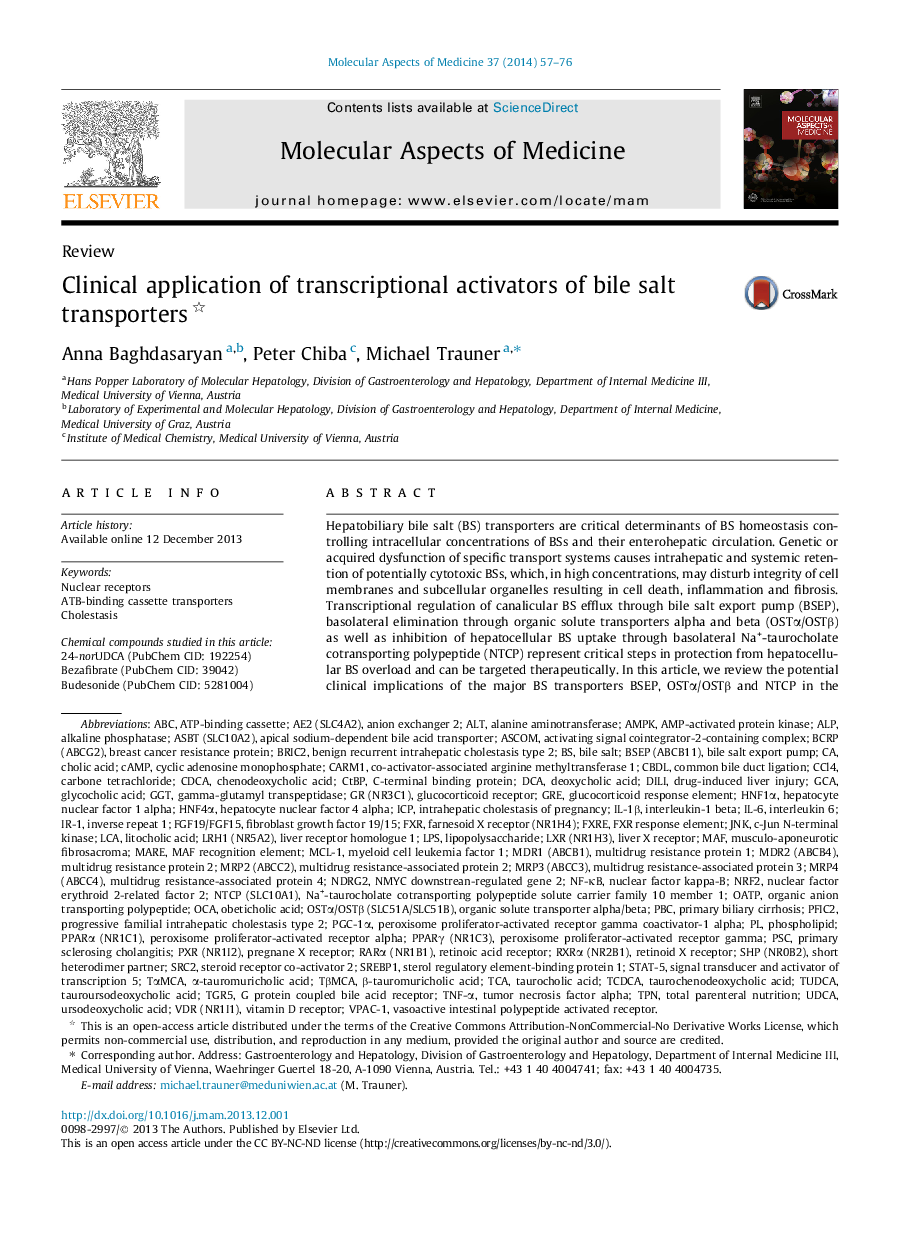| Article ID | Journal | Published Year | Pages | File Type |
|---|---|---|---|---|
| 8341474 | Molecular Aspects of Medicine | 2014 | 20 Pages |
Abstract
Hepatobiliary bile salt (BS) transporters are critical determinants of BS homeostasis controlling intracellular concentrations of BSs and their enterohepatic circulation. Genetic or acquired dysfunction of specific transport systems causes intrahepatic and systemic retention of potentially cytotoxic BSs, which, in high concentrations, may disturb integrity of cell membranes and subcellular organelles resulting in cell death, inflammation and fibrosis. Transcriptional regulation of canalicular BS efflux through bile salt export pump (BSEP), basolateral elimination through organic solute transporters alpha and beta (OSTα/OSTβ) as well as inhibition of hepatocellular BS uptake through basolateral Na+-taurocholate cotransporting polypeptide (NTCP) represent critical steps in protection from hepatocellular BS overload and can be targeted therapeutically. In this article, we review the potential clinical implications of the major BS transporters BSEP, OSTα/OSTβ and NTCP in the pathogenesis of hereditary and acquired cholestatic syndromes, provide an overview on transcriptional control of these transporters by the key regulatory nuclear receptors and discuss the potential therapeutic role of novel transcriptional activators of BS transporters in cholestasis.
Keywords
ABCAMPKDCANF-κBGGTLPSIL-6JnkICPNrf2TCAMAFMcl-1PSCALTCCl4GCAGREIL-1βPGC-1αNDRG2TUDCARetinoid X receptorTPNCDCAOCAHNF1αPBCFXRUDCACBDLPFIC2progressive familial intrahepatic cholestasis type 2TGR5HNF4αOATPhepatocyte nuclear factor 1 alphaCARM1CtBPFenofibrate (PubChem CID: 3339)Budesonide (PubChem CID: 5281004)SREBP1Rifampicin (PubChem CID: 5381226)STAT-5TCDCAFXRELitocholic acidTβMCAMaf recognition elementAMP-activated protein kinasec-Jun N-terminal kinasecAMPCyclic adenosine monophosphateDrug-induced liver injuryAlanine aminotransferaseperoxisome proliferator-activated receptor alphaALPAlkaline phosphataseLCAChenodeoxycholic acidDeoxycholic acidobeticholic acidTauroursodeoxycholic acidtaurochenodeoxycholic acidTaurocholic acidCholic acidglycocholic acidUrsodeoxycholic acidapical sodium-dependent bile acid transporterinterleukin 6Interleukin-1 betatumor necrosis factor alphaDILIPrimary biliary cirrhosishepatocyte nuclear factor 4 alphaGlucocorticoid response elementTNF-αnuclear factor erythroid 2-related factor 2nuclear factor kappa-Bsignal transducer and activator of transcription 5Phospholipidlipopolysaccharidemareanion exchanger 2Bile saltperoxisome proliferator-activated receptor gamma coactivator-1 alphaC-terminal binding proteinsterol regulatory element-binding protein 1multidrug resistance-associated protein 2multidrug resistance-associated protein 3multidrug resistance-associated protein 4breast cancer resistance proteinmultidrug resistance protein 1Multidrug resistance protein 2Organic anion transporting polypeptideBile salt export pumpcommon bile duct ligationliver X receptorTotal parenteral nutritionPrimary sclerosing cholangitischolestasisIntrahepatic cholestasis of pregnancyshort heterodimer partnerATP-binding cassettegamma-glutamyl transpeptidasePeroxisome proliferator-activated receptor gammaRetinoic acid receptorVitamin D receptorPregnane X receptorglucocorticoid receptornuclear receptors
Related Topics
Life Sciences
Biochemistry, Genetics and Molecular Biology
Biochemistry
Authors
Anna Baghdasaryan, Peter Chiba, Michael Trauner,
